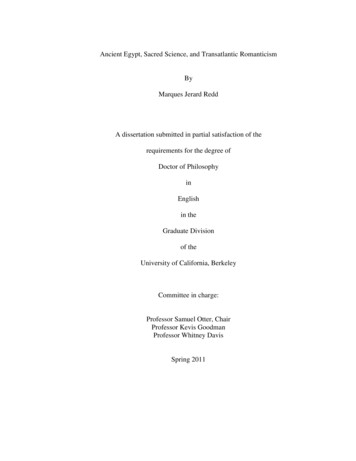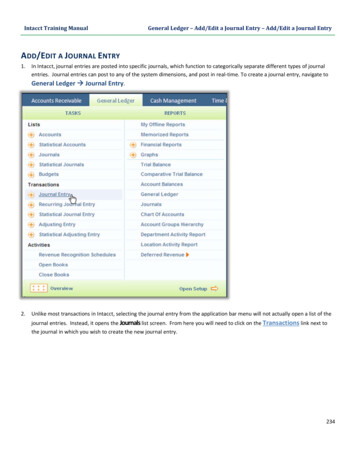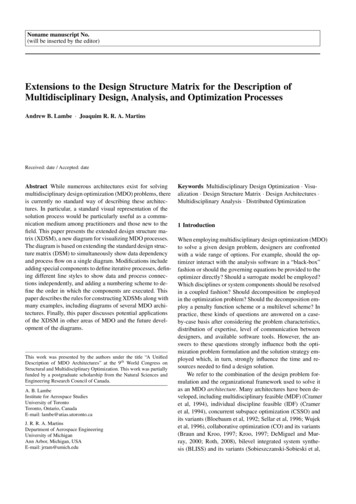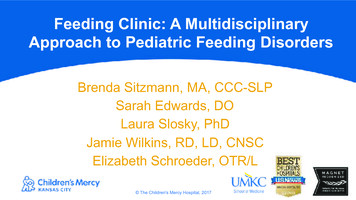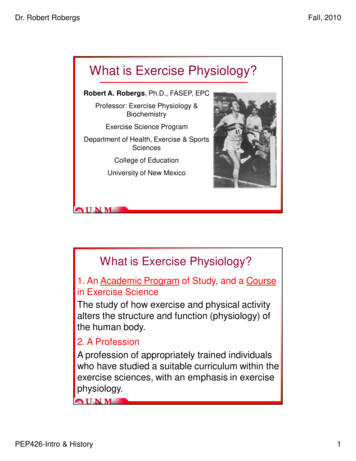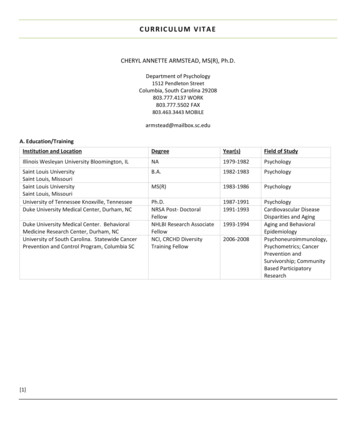
Transcription
Transatlantic Journal of Multidisciplinary Research(TJMR)-p-ISSN: 2672-5371e-ISSN:2735-9808Journal Homepage: https://tjmr.orgInfluence of Youths Unemployment On Youths Restiveness: A Study of Jalingo LocalGovernment Area of Taraba State, NigeriaNwosu Chinedu Everest11&2Abigail Moses Embwa.2Department of Sociology, Taraba State University, Jalingo, Taraba State NigeriaCorresponding Author: Nwosu Chinedu Everest E-mail: everestinox @yahoo.comARTICLE INFORMATIONABSTRACTVolume: 4Issue: 1DOI: 10.5281/zenodo.6599132KEYWORDSYouths, Unemployment,Restiveness, Armed Robbery,KidnappingThis study investigates whether youths unemployment has influence on youthsrestiveness using Jalingo Local Government Area of Taraba State, Nigeria as the studylocale. With the aid of the study objectives, hypotheses were formulated in the study.A sample size of 399 was adopted from the population of the study using Taro Yamaneformula for sample size determination. The stratified random sampling technique wasapplied in this study. The summation of all the responses was presented usingfrequency distribution tables and simple percentages, while the chi-square statisticaltool was used to test the hypotheses formulated in the study. The test statistics revealsamong others that, there is a significant relationship between youth’s unemploymentand armed robbery in Jalingo Local Government Area of Taraba State. The studyconcludes that unemployment influences youths to indulge or involve in restivenessin the form of armed robbery and kidnapping in Jalingo Local Government Area ofTaraba State, Nigeria. The study recommends among others that Taraba Stategovernment, non-governmental organizations, and well meaning citizens in the stateshould create employment opportunities for the teeming unemployed youths.Through this strategy, the youths that are unemployed would be gainfully employedand shy away from indulging in armed robbery as an act of youths restiveness.IntroductionWithin the past, young people were seen as heroes of the patriot development and aggressors in anti-colonial battle.They rendered important commitments to the battle for freedom and national improvement which earned them titleas individuals acting beneath safe young richness (Chukwuezi, 2009). Across the world every society is bedeviled withweird troubles and tribulations. As a developing nation, Nigeria faces political, economic, legal, technological,agricultural, and social tribulations which have severely hampered the well-being of the populace (Okafor, 2005). Oneof the social problems bedeviling Nigeria for a number of years is youth’s unemployment which is continually on therise notwithstanding the plentiful human and natural resources in Nigeria. Annually, good numbers of students aregraduated but there are insufficient job opportunities for the graduates. Streets in Nigeria are besieged with younggraduates who normally would have gained paid labour in government and non-government organizations.According to Chukwuemeka and Agbara (2010), restiveness is on the rise within the Niger-Delta region in Nigeria owingto the fact that youth unemployment, poverty and other associated social vises are found to be in existence in theregion. Youth’s restiveness would be put to a stop in Nigeria if the youths are gainfully employed given that, ‘an idlemind is a devil’s workshop’. Ikechukwu (2018) contend that in many occasions, youth’s restiveness manifest in act ofarm robbery, assault, attacks on innocent people, unwarranted armed protest, terrorism, banditry and host of othernegative activities which can lead to destruction of lives and properties, causing fear among the populace and byextension discouraging economic or commercial activities. Ezedikachi (2020), stressed that on numerous situations ofunprecedented violence, kidnapping, malicious obliteration of appreciated structures as well as lives and properties hastaken place in Nigeria on countless times. It is commonly reported that poverty, unemployment amid others areresponsible for high level of insecurity caused by youth restiveness in the form of bombing mosques, churches, marketsand killing of innocent people. The occurrence of insecurity has become one of the main worries of the citizens inNigeria especially in the Northern part of the country.Copyright: 2022 the Author(s). This article is an open access article distributed under the terms and conditions of the CreativeCommons Attribution (CC-BY) 4.0 license (https://creativecommons.org/licenses/by/4.0/). Published by Transatlantic Research andDevelopment Study Group.Page 12
TJMR 4(1A good number of Nigerians are of the opinion that unavailability of jobs, corruption, and maladministration havecontributed to and motivated youths in engaging into unlawful acts. Osuji, Ekhamheye and Tony-Okolo (2021),maintained that incidences such as armed robbery, prostitution, bomb blasts, assassinations, kidnapping, banditry, killerherdsmen, and religious crises are certainly becoming a norm in Nigeria that is formerly a peaceful nation. Similarly,Eme (2012) stressed that resultantly, crime has become a more striking alternative for some Nigerian universitygraduates due to lack of employment opportunities. In Nigeria, it is familiar to come across a number of graduateswandering the streets in search for jobs that are not easy to be found some years after graduation thereby leading tocrimes such as armed robbery, pipeline vandalism, oil bunkering, and prostitution amongst the youths.Statement of the ProblemAttestations and reactions from people mostly the youths have shown that, there appears to be linkage between youth’sunemployment and youth restiveness in Nigeria. Their assumption is that, youths that are unemployed appear to bepredisposed to anti-social behaviours and different kinds of restiveness such as armed robbery, kidnapping, etc. inorder to actualize their expected desires. On the other hand, some people attest that although Nigeria is bedeviled withnefarious incidents due to high wave of unemployment, youths are contented with what they posses and do not indulgein different kinds of restiveness in order to meet up with the challenges in life. It is in light of the these situations thatthis study investigates whether youth’s unemployment influences youths to indulge in restiveness in the form of armedrobbery and kidnapping in Nigeria using Jalingo Local Government Area of Taraba State as the study locale.Research QuestionsSequel to the foregoing issues in the statement of the problem, the following research questions are deemed imperativefor this study;i.Does youth’s unemployment influences youths to indulge in armed robbery in Jalingo LocalGovernment Area of Taraba State?ii.Does youth’s unemployment influences youths to involve in kidnapping in Jalingo Local GovernmentArea of Taraba State?Objectives of the StudyThe general objective of this study is to investigate whether youth’s unemployment influences youths to indulge inrestiveness in Jalingo Local Government Area of Taraba State, Nigeria. While the specific objectives are to:i.Ascertain whether youth’s unemployment influences youths to indulge in armed robbery in JalingoLocal Government Area of Taraba State.ii.Explore whether youth’s unemployment influences youths to involve in kidnapping in Jalingo LocalGovernment Area of Taraba State.Research HypothesesThe following hypotheses are formulated in this study:H01: There is no significant relationship between youth’s unemployment and armed robbery in Jalingo LocalGovernment Area of Taraba State?H02: There is no significant relationship between youth’s unemployment and kidnapping in Jalingo LocalGovernment Area of Taraba State?Conceptual ClarificationsConceptualizing Youths UnemploymentAccording to Adebayo (1999), an individual is said to be unemployed when the individual is able and willing to workand available for work but does not have work. Youth’s unemployment is a situation whereby young people within theworking age remain without any gainful employment. In another dimension, Fajana (2000) posits that, youth’sunemployment entails a situation whereby youths who are eager and competent of working are not capable to comeacross appropriate paid labour. Also, youth unemployment entails lack of employment and idleness of young individualsseeking employment at a prevailing wage rate. Youth’s unemployment is a situation whereby young persons who areavailable, capable, and qualified are seeking for jobs but could not secure job opportunities, including youths who havelost their jobs and youths who willingly abandoned their jobs for reasons best known to them.13
Influence of Youths Unemployment On Youths Restiveness: A Study of Jalingo Local Government Area of Taraba State,NigeriaAwogbenle and Iwuamadi (2010), maintained that the recent situation on youth unemployment in Nigeria is anindication of wide-ranging profligacy that has affected the country extremely and an outcome of numerous incidents.Most importantly among the profligacy’s are; neglecting agricultural sector and depending heavily on oil revenue,execution of elevated persuasive unethical principles, lofty deception amongst politicians and bureaucrats, and thequality of education to students at all levels which is geared towards wage employment and bereft of entrepreneurshipdevelopment. Ajufo (2013) narrated that due to the widespread of unemployment globally, many youths have engagedinto kidnapping as a means of survival. Presently, there have been remarkable undesirable issues in socio-economicand political developments in Nigeria, an outcome of youth unemployment and under-employment predominantlyexemplified by rising youth militancy and political instability.Conceptualizing Youths RestivenessAccording to Ogbeifun (2007) restiveness entails when youths engage in authentic protest for their rights and restitutionof the youths; youths indulging in a self-egotistic and unlawful actions; and youths agitating for vengeance for nefariousbehaviours of the elites having used and dumped them. Ikechukwu (2018) averred that man’s unenthusiastic side ofsocial enhancement is portrayed by youth’s restiveness. The unenthusiastic social enhancement development is quiteregrettable and has turned out to be one of the numerous security challenges bedeviling human in our contemporarysociety. Ejumudo (2014) maintained that youth restiveness relates to protest by the youths over issues of dispossession,overlook, isolation, and thoughts of discontent. The commitment by the youths in protest for the reinstatement of theirprivileges and self-esteem or self-interested and immoral actions, that can be either helpful or unhelpful, is withoutdoubt a well known socio-economic predicament in Nigeria.Youth restiveness is described by Nlerum (2012), as the rejection to be directed by the youths for the reason that theyfeel jaded as well as unfulfilled by way of the recent happenings in the society to which the youths are part of or thingsconcerning the youths particularly. A situation whereby the youth is subjected to play pranks by way of declining froma better to a worse situation in the case of restiveness, the outcome is always destructive due to the strength and largenumber of the youths involved. Ejumudo (2014) stressed that the serious implication of youth’s restiveness in the NigerDelta is obvious for the reason that, youths are the vigorous portion whose vigor may perhaps be transformed towardscreative job for person, the people, and countrywide growth. Youth’s negligence in the Niger-Delta region and youth’sinvolvement in unhelpful and infertile deeds have socio-economically accrued into moribund situations as well asdeprived the services of the youths who ordinarily are the future of Nigeria as a nation.Research MethodologyThe survey research design was adopted in this study. This was because, it has the advantage of effectively aiding theresearchers to gather first hand information from a selected portion of the population through the questionnairemethod in order to investigate the relationship between youths unemployment and youths restiveness in Jalingo LocalGovernment Area of Taraba State, Nigeria. The population of the study was the inhabitants of Jalingo Local GovernmentArea of Taraba State, Nigeria. According to National Population Commission (2006), the population of Jalingo LocalGovernment Area is one hundred and forty thousand, three hundred and eighteen (140, 318). To determine the samplesize for the study, the Taro Yamane (1967) formula for sample size determination was applied and the sample size of399 was chosen for the study. In choosing the sample for the study, the stratified random sampling technique wasapplied. The technique was applied to determine the number of respondents that was drawn from each of thewards/communities in Jalingo Local Government Area since the wards/communities do not have equal number ofpopulation. In order to boost the information needed for a thorough and objective conduct of this study, the studyemployed both the primary and secondary sources of data collection. The primary source of data collection consists ofquestionnaire. The questionnaire was deemed imperative for this study because, it creates room for anonymity ofrespondents, reduces bias errors, and ensures reliability and high response rate in a research while the secondarysources of data collection consists of information generated from text books, journal articles, and conferenceproceedings. The indicators of the dependent variable “youths restiveness” in this study are: armed robbery andkidnapping. The questionnaire was structured in Likert summated format with a modified four-point response scale. Inthis type of questionnaire, the respondents were given respond options. These options served as the quantification ofthe respondent’s agreement or disagreement on a particular scale. The designated quantifications that were used inthe questionnaire are: Strongly Agree-4, Agree-3, Disagree-2, and Strongly Disagree-1. Out of 399 copies ofquestionnaire distributed, 358 copies were successfully retrieved and this formed the basis for analyzing the datagenerated from the field. In this study, frequency distribution tables were used to present the raw data from the fieldquantitatively for the purpose of easy and accurate interpretation, the simple percentages (%) was used to present thePage 14
TJMR 4(1response rate of the questions asked and to convert data generated from the field into a more statistical constructionso as to produce a concise report, while the chi-square (x2) statistical tool was used to test the hypotheses formulatedin the study.The formula for chi-square is stated below.X2 (0-E) 2EWhere,2X Chi-square Summation SignO Observed FrequenciesE Expected FrequenciesGiven the above formula, to calculate the expected frequency of a cell the formula runs thus; F Row Total x Column TotalGrand TotalAccommodating the unforeseen chance factors, the researcher sets the level of significance at 5%. Also, the degree offreedom is determined in order to apply the Chi-square (x2) text.df (r-1) (c-1)r Number of Rowsc Number of ColumnsDecision Rule1. If the calculated value of chi-square (X2) is greater than the critical value of chi-square (X2), reject the null hypothesis.2. If the calculated value of chi-square (X2) is less than the critical value of chi-square (X2), accept the null hypothesis.Theoretical FrameworkThe Relative Deprivation Theory was preferred as the theory suitable to guide this study. Relative deprivation theorywas propounded by Ted Robert Gurr in 1970. Relative deprivation theory according to Walker and Smith (2001) entailssocial change and movements according to which people take action in order to obtain something that others own andwhich they (people) suppose to have. In their own reaction, Dambrun, Taylor, McDonald, Crush, and Méot (2006),maintained that relative deprivation theory is used to explain thoughts or procedures of political, economic and socialdispossession that are relative rather than absolute. The theory has significant implications for behaviour and attitudesas well as feelings of stress, and involvement in combined actions.The implication/relevance of relative deprivation theory as it applies to this study is that, youths restiveness in the formof armed robbery and kidnapping could be attributed to negligence and deprivation of valuable things such as funds,food, clothing, justice, employment opportunities etc. deemed or considered valuable amongst youths in Nigeriansociety. Additionally, depriving youths the opportunity of actualizing what they set out to achieve can accrue tofrustration and lengthened frustration can equally accrue to aggression. There is always the tendency that as a result ofaggression, youths who through one way or the other seek for jobs in order to survive and meet up with the challengesin life and could not secure job opportunities can indulge in different forms of restiveness without considering theconsequences in our contemporary society.15
Influence of Youths Unemployment On Youths Restiveness: A Study of Jalingo Local Government Area of Taraba State,NigeriaData PresentationResearch Question: Does youth’s unemployment influences youths to indulge in armed robbery in JalingoLocal Government Area of Taraba State?Table 1: Respondents perception on whether youth’s unemployment influences youths to indulge in armedrobbery in Jalingo Local Government Area of Taraba StateSNItemsSAADSDTotal1.Cases of armed robbery could beattributedtoyouthsthatareunemployed in Jalingo LGA.2.Youths that are unemployed are usuallyfrustrated and can easily indulge inarmed robbery to enrich themselves.3.No matter the level of unemployment,youths in Jalingo LGA see armed robberyas a crime and therefore do not indulgein the act.TotalSource: Field Survey, 81781,074Table 1 shows the respondents perception on whether youth’s unemployment influences youths to indulge in armedrobbery in Jalingo Local Government Area of Taraba State. In question 1, out of 358 respondents, (31.1%) stronglyagreed that, cases of armed robbery could be attributed to youths that are unemployed in Jalingo LGA, (37.8%) agreed,(17.2%) disagreed, while (13.9%) strongly disagreed. In question 2, out of 358 respondents, (28.3%) strongly agreedthat, youths that are unemployed are usually frustrated and can easily indulge in armed robbery to enrich themselves,(41.4%) agreed, (18.8%) disagreed, while (11.5%) strongly disagreed. In question 3, out of 358 respondents, (14.9%)strongly agreed that, no matter the level of unemployment, youths in Jalingo LGA see armed robbery as a crime andtherefore do not indulge in the act, (20.7%) agreed, (40.6%) disagreed, while (23.8%) strongly disagreed. From table 1above, it infers that the respondents responded greatly that youth’s unemployment influences youths to indulge inarmed robbery in Jalingo Local Government Area of Taraba State.Research Question: Does youth’s unemployment influences youths to involve in kidnapping in Jalingo LocalGovernment Area of Taraba State?Table 2: Respondents perception on whether youth’s unemployment influences youths to involve in kidnappingin Jalingo Local Government Area of Taraba StateSNItemsSAADSDTotal4Do you agree that kidnapping hasincreased rapidly in Jalingo LGA with therising rate of youth’s 358(100)5Adoption of people in Jalingo LGA couldalso be attributed to youths that areunemployed in order to make 00)6Unemployed youths in Jalingo LGA do notinvolve in kidnapping in order to meet upwith the challenges in )2953561972261,074TotalSource: Field Survey, 2021.Page 16
TJMR 4(1Table 2 shows the respondents perception on whether youth’s unemployment influences youths to involve inkidnapping in Jalingo Local Government Area of Taraba State. In question 4, out of 358 respondents (35.7%) stronglyagreed that that Kidnapping has increased rapidly in Jalingo LGA with the rising rate of youth’s unemployment, (43.8%)agreed, (11.4%) disagreed, while (8.9%) strongly disagreed. In question 5, out of 358 respondents, (33.0%) stronglyagreed that, adoption of people in Jalingo LGA could also be attributed to youths that are unemployed in order tomake ransom, (40.5%) agreed, (11.7%) disagreed, while (14.8%) strongly disagreed. In question 6, out of 358respondents, (13.7%) strongly agreed that unemployed youths in Jalingo LGA do not involve in kidnapping in order tomeet up with the challenges in life, (15.0%) agreed, (31.8%) disagreed, while (39.4%) strongly disagreed. From table 2above, it infers that the respondents responded greatly that, youth’s unemployment influences youths to involve inkidnapping in Jalingo Local Government Area of Taraba State.Statistical Analysis and Test of HypothesesTest of Hypothesis OneHo: There is no significant relationship between youth’s unemployment and armed robbery in Jalingo LocalGovernment Area.Hi: There is a significant relationship between youth’s unemployment and armed robbery in Jalingo LocalGovernment Area.Hypothesis one was tested using the values of responses in research questions 1, 2, and 3 respectively in table 1.Table 3: Contingency Table of Observed ,074NSource: Field Survey, 2021.Table 4: Calculation of Expected FrequenciesCell266x358Cell266x358A1 B11,074A1 B21,074 87 87Cell362x358Cell362x358A2 B11,074A2 B21,074 121 121Cell268x358Cell268x358A3 B11,074A3 B21,074 89 89Cell178x358Cell178x358A4 B11,074A4 B21,074 59 59Source: Field Survey, 2021.17CellA1 B3CellA2 B3CellA3 B3CellA4 B3266x3581,074 87362x3581,074 121268x3581,074 89178x3581,074 59
Influence of Youths Unemployment On Youths Restiveness: A Study of Jalingo Local Government Area of Taraba State,NigeriaTable 5: Placing the Observed and Expected Frequencies forTest of Hypothesis rce: Field Survey, 13.28714.57835.2368.203109.271From the contingency table,DF (r-1) (c-1) (3-1) (4-1) 2 3 6Thus DF 6Decision Rule: At 0.05 level of significance with 6 degree of freedom, the table value of chi-square (x2) 12.592 whilethe calculated value of chi-square (x2) 109.271. Given that the calculated value of chi-square (x2 cal) is greater thanthe table value (x2 table), we accept the alternative hypothesis (H1) which states that there is a significant relationshipbetween youth’s unemployment and armed robbery in Jalingo Local Government Area of Taraba State.Test of Hypothesis TwoHo: There is no significant relationship between youth’s unemployment and kidnapping in Jalingo LocalGovernment Area.Hi: There is a significant relationship between youth’s unemployment and armed kidnapping in Jalingo LocalGovernment Area.Hypothesis two was tested with the values of responses in research questions 4, 5, and 6 respectively in table 2.Table 6: Contingency Table of Observed 1,074NSource: Field Survey, 2021.Page 18
TJMR 4(1Table 7: Calculation of Expected FrequenciesCell295x358Cell295x358A1 B11,074A1 B21,074 98 98Cell356x358Cell356x358A2 B11,074A2 B21,074 119 119Cell197x358Cell197x358A3 B11,074A3 B21,074 66 66Cell226x358Cell226x358A4 B11,074A4 B21,074 75 75Source: Field Survey, 2021.CellA1 B3CellA2 B3CellA3 B3CellA4 B3295x3581,074 98356x3581,074 119197x3581,074 66226x3581,074 75Table 8: Placing the Observed and Expected Frequencies forTest of Hypothesis otalSource: Field Survey, 6.45324.535.50434.90958.08233.376From the contingency table,DF (r-1) (c-1) (3-1) (4-1) 2 3 6Thus DF 6Decision Rule: At 0.05 level of significance with 6 degree of freedom, the table value of chi-square (x2) 12.592 whilethe calculated value of chi-square (x2) 233.376. Given that the calculated value of chi-square (x2 cal) is greater thanthe table value (x2 table), we accept the alternative hypothesis (H1) which states that there is a significant relationshipbetween youth’s unemployment and kidnapping in Jalingo Local Government Area of Taraba State.Discussion of Research FindingsThe result of the first hypothesis in this study reveals that, there is a significant relationship between youth’sunemployment and armed robbery in Jalingo Local Government Area of Taraba State. This is in consonance with Eme,19
Influence of Youths Unemployment On Youths Restiveness: A Study of Jalingo Local Government Area of Taraba State,Nigeria(2012) who stressed that resultantly, crime has become a more striking alternative for some Nigerian universitygraduates due to lack of employment opportunities. In Nigeria, it is ordinary to come across a number of graduateswandering the streets in search for jobs that are not easy to be found some years after graduation thereby leading tocrimes such as armed robbery, pipeline vandalism, oil bunkering, and prostitution amongst the youthsThe result of the second hypothesis in this study reveals that, there is a significant relationship between youth’sunemployment and kidnapping in Jalingo Local Government Area of Taraba State. This is in tandem with Ajufo (2013)who narrated that due to the widespread of unemployment globally, many youths have engaged into kidnapping as ameans of survival. Presently, there have been remarkable undesirable issues in socio-economic and politicaldevelopments in Nigeria, a result of youth unemployment and under-employment predominantly exemplified by risingyouth militancy and political instability.Conclusion and RecommendationsBased on the findings, the study concludes that unemployment can influence youths to indulge or involve in restivenessin the form of armed robbery and kidnapping in Jalingo Local Government Area of Taraba State, Nigeria. For this reason,the following recommendations are proffered:Taraba State government, non-governmental organizations, and well meaning citizens in the state shouldcreate employment opportunities for the teeming unemployed youths. Through this strategy, the youths thatare unemployed would be gainfully employed and shy away from indulging in armed robbery as an act ofyouths restiveness.ii. Elected representatives at all levels in Taraba State should as a matter of necessity, establish skills acquisitioncentres and programmes for the teeming unemployed youths as this would enable the youths to acquirerelevant skills, knowledge, and values and establish their own businesses and deceit from involving inkidnapping as part of youths restiveness.iii. Government at all levels in Nigeria should ensure strict compliance to technical skills acquisition anddevelopment programmes in tertiary institutions in Nigeria both public and private. By so doing, studentswould acquire relevant skills, values, and knowledge and establish themselves and restiveness accruing fromunemployed youths would be drastically reduced in our contemporary society.iv. Nigerian government should establish free skills acquisition centres and programmes to enable our teemingunemployed youths to obtain relevant skills, values, and knowledge. At the completion of the skills acquisitionprogrammes, the unemployed youths should be provided with loans as take-off funds to start off their ownbusiness and stand the opportunity to excel in life without indulging in any form of restiveness.i.Funding: “This research received external funding from Tertiary Education Trust Fund (TETFUND) Nigeria.Conflicts of Interest: “The authors declare no conflict of interest.”ReferencesAdebayo, A. (1999). Youths unemployment and national directorate of employment self employment programmes.Nigerian Journal of Economics and Social Studies. 4 (1), 81-93.Ajufo, B.I. (2013). Challenges of youth unemployment in Nigeria: effective career guidance as a panacea. AfricanResearch Review. 7 (1), 307-321.Awogbenle, A.C. & Iwuamadi, K.C. (2010). Youth unemployment: entrepreneurship development programme as anintervention mechanism. African Journal of Business Management, 4 (6), 831-835.Page 20
TJMR 4(1Chukwuemeka, E.E.O., & Agbara, V.N.O. (2010). Niger-Delta youth restiveness and socio-economic development ofNigeria. Educational Research and Reviews 5 (7), 400-407.Chukwuezi, C.O. (2009) Poverty and youth restiveness in Nigeria: implication for national development. Journal of SocialSciences. 2 (2),97-103Dambrun, M., Taylor, D.M., McDonald, D.A., Crush, J., & Méot, A. (2006). The relative deprivation-gratification continuumand the attitudes of South Africans towards immigrants: a test of the v-curve hypothesis. Journal of Personalityand Social Psychology. 91 (6), 10-22.Ejumudo, K.B.O. (2014). Youth restiveness in the Niger Delta: a critical discourse. Sage Open. 1-12.Eme, I.E.J. (2012). Tackling youth unemployment in Nigeria: the Lagos State development and empowermentprogrammes initiatives. Afro Asian Journal of Social Sciences (3), 13-21.Ezedikachi, N.E. (2020). Youth restiveness and economic development in Nigeria: a study of Niger-Delta. Journal ofPolitical Science and International Relations. 3 (3), 70-83Fajana, S. (2000). Functioning of the Nigerian labour market: Labonfin and Company, :whoistob
Nwosu Chinedu Everest1 Abigail Moses Embwa.2 1&2 Department of Sociology, Taraba State University, Jalingo, Taraba State Nigeria Corresponding Author: Nwosu Chinedu Everest E-mail: everestinox @yahoo.com ARTICLE INFORMATION ABSTRACT Volume: 4 Issue: 1 DOI: 10.5281/zenodo.6599132
